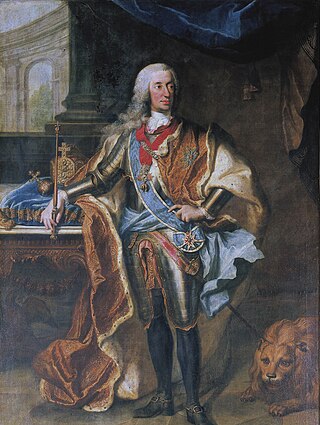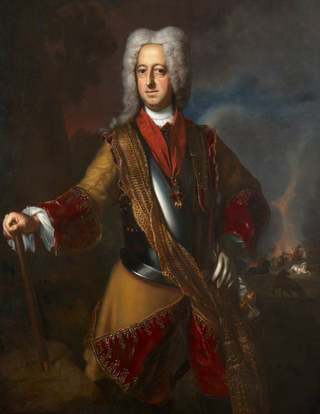See also
- Maximilian, award-winning New York furriers founded around 1942.
- Massimiliano
- Maximilla
- Maximiliano
- Maximillion
| Pronunciation | /ˌmæksɪˈmɪliən/ German: [maksiˈmiːli̯aːn] Polish: [maksɨˈmʲilʲjan] |
|---|---|
| Gender | Male |
| Origin | |
| Word/name | Latin |
| Other names | |
| Related names | Maximiliano, Massimiliano, Maximus, Maxim, Max, Maxie |
Maximilian or Maximillian (Maximiliaan in Dutch and Maximilien in French) is a male name.
The name "Max" is considered a shortening of "Maximilian" as well as of several other names.

The House of Wittelsbach is a former Bavarian dynasty, with branches that have ruled over territories including the Electorate of Bavaria, the Electoral Palatinate, the Electorate of Cologne, Holland, Zeeland, Sweden, Denmark, Norway, Hungary, Bohemia, and Greece. Their ancestral lands of Bavaria and the Palatinate were prince-electorates, and the family had three of its members elected emperors and kings of the Holy Roman Empire. They ruled over the Kingdom of Bavaria which was created in 1805 and continued to exist until 1918.

Charles VII was Prince-Elector of Bavaria from 26 February 1726 and Holy Roman Emperor from 24 January 1742 to his death. He was also King of Bohemia from 1741 to 1743. Charles was a member of the House of Wittelsbach, and his reign as Holy Roman Emperor thus marked the end of three centuries of uninterrupted Habsburg imperial rule, although he was related to the Habsburgs by both blood and marriage.

Maximilian II, also known as Max Emanuel or Maximilian Emanuel, was a Wittelsbach ruler of Bavaria and a Prince-elector of the Holy Roman Empire. He was also the last governor of the Spanish Netherlands and Duke of Luxembourg. An able soldier, his ambition led to conflicts that limited his ultimate dynastic achievements.

Maximilian I Joseph was Duke of Zweibrücken from 1795 to 1799, prince-elector of Bavaria from 1799 to 1806, then King of Bavaria from 1806 to 1825. He was a member of the House of Palatinate-Birkenfeld-Zweibrücken, a branch of the House of Wittelsbach.
Anthony or Tony Martin may refer to:

The King of Bavaria was a title held by the hereditary Wittelsbach rulers of Bavaria in the state known as the Kingdom of Bavaria from 1805 until 1918, when the kingdom was abolished. It was the second time Bavaria was a kingdom, almost a thousand years after the short-lived Carolingian kingdom of Bavaria.
Gruber is a German surname from Austria and Bavaria, referring to a person from a geological depression, mine, or pit. It may refer to:

Maximilian III Joseph, "the much beloved", was a Prince-elector of the Holy Roman Empire and Duke of Bavaria from 1745 to 1777. He was the last of the Bavarian branch of the House of Wittelsbach and because of his death, the War of Bavarian Succession broke out.
Vogel and De Vogel are surnames originating in German and Dutch-speaking countries. An alternate spelling is Fogel. Vogel is the German and Dutch word for "bird". Equivalent surnames are Bird or Byrd in English or L'Oiseau in French. Notable people with the surname include:

Strauss, Strauß or Straus is a common Germanic surname. Outside Germany and Austria Strauß is usually spelled Strauss. In classical music, "Strauss" most commonly refers to Richard Strauss or Johann Strauss II.

Sebastian is both a given name and a surname. It comes from the Greek name Sebastianos (Σεβαστιανός) meaning "from Sebastia" (Σεβάστεια), which was the name of the city now known as Sivas, located in the central portion of what is now Turkey; in Western Europe the name comes through the Latinized intermediary Sebastianus. It was a name of ancient Greek origin, given to children not born free and found on the streets of Sebastia. The name of the city is derived from the Greek word σεβαστός (sebastos), "venerable", which comes from σέβας (sebas), "awe, reverence, dread", in turn from the verb σέβομαι (sebomai), "feel awe, scruple, be ashamed". Sebastos was the Greek calque of the title Augustus, which was used for Roman emperors. Sebastian became a widely used name because it was the name of Saint Sebastian, a third-century Christian martyr.

Marcus is a masculine given name of Ancient Roman pre-Christian origin derived either from Etruscan Marce of unknown meaning or referring to the god Mars. Mars was identified as the Roman god of War.
Graf is an ancient German and Swiss rooted name. In the United States, there are 16,620 people with this last name making it the 2445th most popular surname. Some notable people with this surname include:

Duchess Helene in Bavaria, nicknamed Néné, was the Hereditary Princess of Thurn and Taxis as the wife of Maximilian Anton Lamoral. She was a Duchess in Bavaria by birth as the daughter of Duke Maximilian Joseph and Princess Ludovika. She was temporarily the head of the Thurn and Taxis family.
Willy or Willie is a masculine, male given name, often a diminutive form of William or Wilhelm, and occasionally a nickname. It may refer to:
Felix is a masculine given name that stems from Latin felix and means "happy" or "lucky". Its feminine form is Felicia or Felicity.
Steiner is a German surname. The name is of Bavarian origin and refers to a person dwelling near a stone, or rock boundary. The name Steiner is common in Bavaria, Switzerland and Austria . Notable people with the surname include:
Emanuel is a given name or last name originating from the Hebrew given name Immanuel.
Max is a given name. In the masculine, it is often short for Maximilian, Maxim, Maxwell, Maxfield, or Maximus in English; Maximos in Greek; or Maxime or Maxence in French. In the feminine it usually stands for Maxine.